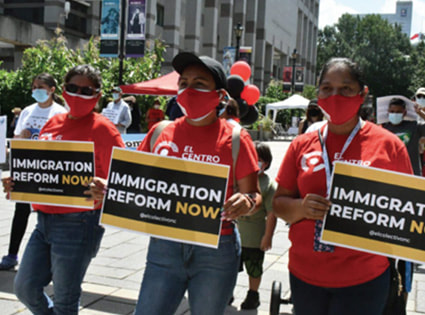What are the immigration reform plans being discussed, and who would they benefit?
The next few weeks will be decisive to know what the strategy of the Democratic senators to advance in the legalization of millions of undocumented immigrants will be.Next week will be decisive to know if immigration reform has the legal argument to fit within a reconciliation project.
On Friday, September 3, U.S. Senator Chuck Schumer, leader of the Democratic majority, explained in a meeting organized by the Hispanic Federation, the different steps that will be considered throughout the month of September to move forward with immigration reform. Eliazar Posada, founder and president of Posada Consulting, a participant in the meeting, told Enlace Latino NC that Senator Schumer spoke about the two plans the Democrats have to turn the dream of millions of immigrants into reality. “The two strategies involve the Senate parliamentarian, who will ultimately regulate the process that must be followed,” Posada said. Plan A: Who is the Senate parliamentarian? Attorney Elizabeth MacDonough is the Senate Parliamentarian whose role is to help ensure consistency in the application of the complex rules of the Senate. “MacDonough will receive the project next week. Her task will be to authorize the start of the reconciliation process,” Posada said. In case of an affirmative recommendation, Posada said, the public hearings will officially begin until the project reaches the plenary for a vote. “It does not go through committees, but hearings that discuss, among other issues, the fiscal impact and the judicial aspect,” Posada said. Posada indicated that according to what Senator Schumer said, if this bill is approved, about 8 million undocumented immigrants would benefit. “Schumer ratified that it would cover DACA recipients, TPS, agricultural and essential workers, but not the 11 million undocumented immigrants presently in the US.” What is plan ‘B’? In case the parliamentarian does not authorize the project within the reconciliation package, Schumer referred to a plan “B”. “This strategy is to make an amendment to the immigration law signed by President Ronald Reagan in 1986,” Posada said. Under current law, some undocumented immigrants can obtain permanent residency through registration. According to the USCIS, registration is a section of immigration law that allows certain individuals who have been present in the United States since January 1, 1972, the ability to apply for permanent residency, even if they are currently in the United States illegally. Posada explained that this process would also involve the Senate parliamentarian. “Her task is to define whether the amendment changes the spirit of the law, and decide if it can be done with the simple vote, 50 plus 1, or if it would take all 60 votes to pass.” Proposed amendment The proposed amendment, according to Schumer, would be to run the “Registration line” to January 1, 2010, which is currently January 1, 1972. “That means that all people who entered before that date would qualify to apply for the immigration benefit.” Posada indicated that the Democratic leader stated that in this process the number of immigrants who would benefit would be less than that of the reconciliation project. “He didn’t give an exact number, but we know that perhaps many young DACA recipients who came after that date, as well as essential and agricultural workers, will be left out.” On why that date was chosen, Posada said that Schumer explained that they believe “it could get the green light from the parliamentarian because it is not partisan.” Historic opportunity Analyzing the conversation, the movement, and the moment for immigration reform, Posada said that the time to do so is now. “It’s a once-in-a-lifetime opportunity that Democrats haven’t had before, and now they are being offered it to change the history of millions of immigrants.” “This pandemic has brought light to the work and support of immigrants, and people support immigration reform. That is, they have the votes, and the support of the community.” While Schumer was moderate in hoping for successful immigration reform, Posada said Democrats have a historic opportunity. “Using this window of opportunity depends on them and their ability to reach consensus with the conservative block,” she said. “If they don’t, they have once again failed their word, their promise.” |
